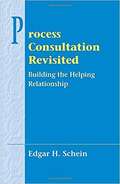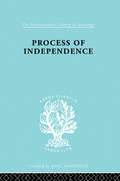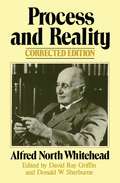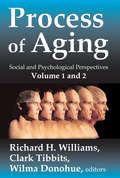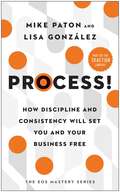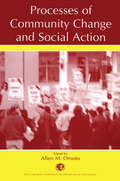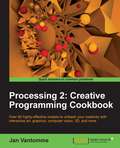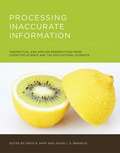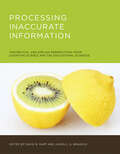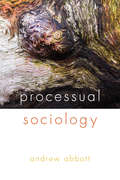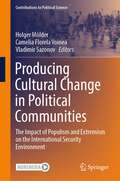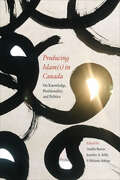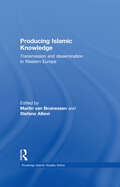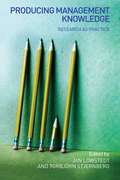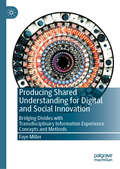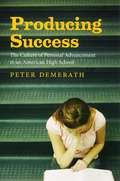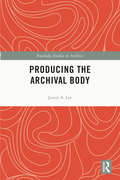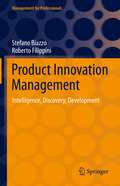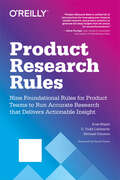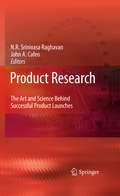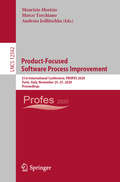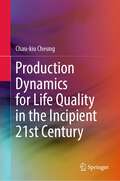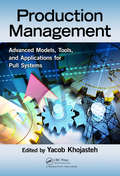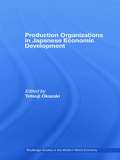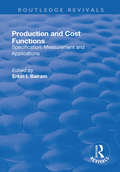- Table View
- List View
Process Consultation Revisited: Building The Helping Relationship (Process Consultation Series #3)
by Edgar ScheinA new member of the renowned PH OD Series! The latest addition to the author’s well-loved set of process consultation books, this new volume builds on the content of the two that precede it while expanding to explore the critical area of the helping relationship. Process Consultation Revisited focuses on the interaction between a consultant and client, and explains how to achieve a healthy helping relationship. Whether the advisor is an OD consultant, therapist, social worker, manager, parent, or friend, the dynamics between advisor and advisee can be difficult to understand and manage. Schein creates a general theory and methodology of helping that will enable a diverse group of readers to navigate the helping process successfully.
Process Of Independence Ils 51 (International Library of Sociology)
by Fatma MansurFirst published in 1998. Routledge is an imprint of Taylor & Francis, an informa company.
Process and Reality
by Alfred North WhiteheadBased on the Gifford Lectures which Whitehead delivered at the University of Edinburgh in 1927-8. Process and Reality presents a system of speculative philosophy which is based on a categorical scheme of investigation designed to explain how concrete aspects of human experience can provide a foundation for our understanding of reality. It also investigates how reality can be defined as a process of becoming.
Process of Aging: Social and Psychological Perspectives
by David PopenoeProcesses of Aging: Social and Psychological Perspectives is based on a monumental series of studies on the psychological and social aspects of aging in relation to mental health. This effort gives scientists from North America and Europe an opportunity to explore the concepts, methodological problems, and conclusions of their researches in the rapidly growing field of gerontology. Much work has been done in an attempt to present this material in sequential and systematic fashion. Original work of sixty-six research workers from twelve countries is represented in this two-volume set. They offer an inventory of principal fields of gerontological research, in advanced countries. Human aging, in its many ramifications, is becoming one of the major areas of research interest among an increasing number of students in the biological, behavioral, and social sciences. Although the phenomena of aging were largely overlooked as subject matter for research during the early stages in the development of all basic sciences, it was inevitable that students would eventually become curious about the final processes of maturation. Events of recent years have hastened the need for social action on behalf of older people and, consequently, the need for scientific knowledge about their characteristics, circumstances, and requirements. Processes of Aging: Social and Psychological Perspectives will be of interest to research workers, teachers, and advanced students concerned with the psychological, psychiatric, psychosocial, and socioeconomic aspects of aging. Many of the theoretical and analytical discussions and the specific studies offer guidance for top-level planners and policy administrators in public agencies and voluntary organizations. This volume is highly sensitive to older people as such: how they feel about themselves and the world, and in the way they behave in relation to others. It is must reading in the health and welfare of aging.
Process!: How Discipline and Consistency Will Set You and Your Business Free (The EOS Mastery Series)
by Mike Paton Lisa GonzálezThis deep-dive into the revolutionary EOS method to strengthen a company&’s process component will help leaders at all companies—from early stage startups to established corporations—run better businesses and live better lives. Part of the TRACTION Library, Process! proves that a high-level, 20/80 approach to getting your core processes &“followed by all&” will help you: Get consistently exceptional results Improve and innovate as necessary Free yourself to live your ideal life If you own, run, or lead in a fast-moving business, you&’re likely driven by passion and a desire to be free. Many leaders mistakenly believe instilling rigor and discipline for process throughout your organizations will inhibit freedom. They couldn&’t be more wrong. It&’s when you&’re stuck in the day-to-day, putting out fires and cleaning up messes, that passion turns to frustration. Freedom seems somewhere between elusive and impossible. The secret to getting unstuck is process. This inspiring, informative field guide will prove it&’s possible to establish rigor and discipline for process while also increasing creativity, flexibility, and innovation. Process! will help you identify a handful of core processes that make your business uniquely valuable. You&’ll learn how to document and simplify the major steps in those processes so they can be done the right and best way, every time. Finally, you&’ll execute a simple, step-by-step plan that is helping more than 10,000 entrepreneurs around the world consistently get the results they want.
Processes of Community Change and Social Action (Claremont Symposium on Applied Social Psychology Series)
by Allen M. OmotoThis volume--an outgrowth of the annual meeting of the Claremont Symposium on Applied Social Psychology--focuses on examples of social change and community action, and the processes at work in creating change. The presenters engaged each other and the audience in thinking about how best to create and sustain social change. This volume represents a product of their cumulative insight, research results, and perspectives, including chapters from each of the symposium presenters, as well as a few selected chapters from other noted scholars. Taken as a whole, the volume is highly accessible and presents findings from provocative and programmatic research that offer illuminating lessons for anyone interested in attempts at community change, civic participation, and social action. Processes of Community Change and Social Action provides cutting-edge and complementary approaches to understanding the causes and effects of broad civic participation. The contributors to this volume are all distinguished researchers and theorists, well known for their work on different aspects of processes of community change and social action. They address topics related to service learning, social movements, political socialization, civil society, and especially volunteerism. This unique interdisciplinary collection appeals to social, personality, community, and developmental psychologists, sociologists, and public health researchers. It also should be of considerable interest to practitioners of social action and individuals working to create social change.
Processing 2: Creative Programming Cookbook
by Jan VantommeA cookbook with a broad sweep of the topic, through lots of practical and useful recipes that are fun to read and do. This book targets creative professionals, visual artists, designers, and students who have a starting knowledge of the Processing Development environment and who want to discover the next level of Processing. Anyone with a creative practice who wants to use computation in their design process. A basic understanding of programming is assumed. However, this book is also recommended to the non-artistic, looking to expand their graphics and artistic skills.
Processing Inaccurate Information
by Jason L.G. Braasch David N. RappOur lives revolve around the acquisition of information. Sometimes the information we acquire -- from other people, from books, or from the media -- is wrong. Studies show that people rely on such misinformation, sometimes even when they are aware that the information is inaccurate or invalid. And yet investigations of learning and knowledge acquisition largely ignore encounters with this sort of problematic material. This volume fills the gap, offering theoretical and empirical perspectives on the processing of misinformation and its consequences.The contributors, from cognitive science and education science, provide analyses that represent a variety of methodologies, theoretical orientations, and fields of expertise. The chapters describe the behavioral consequences of relying on misinformation and outline possible remediations; discuss the cognitive activities that underlie encounters with inaccuracies, investigating why reliance occurs so readily; present theoretical and philosophical considerations of the nature of inaccuracies; and offer formal, empirically driven frameworks that detail when and how inaccuracies will lead to comprehension difficulties.ContributorsPeter Afflerbach, Patricia A. Alexander, Jessica J. Andrews, Peter Baggetta, Jason L. G. Braasch, Ivar Bråten, M. Anne Britt, Rainer Bromme, Luke A. Buckland, Clark A. Chinn, Byeong-Young Cho, Sidney K. D'Mello, Andrea A. diSessa, Ullrich K. H. Ecker, Arthur C. Graesser, Douglas J. Hacker, Brenda Hannon, Xiangen Hu, Maj-Britt Isberner, Koto Ishiwa, Matthew E. Jacovina, Panayiota Kendeou, Jong-Yun Kim, Stephan Lewandowsky, Elizabeth J. Marsh, Ruth Mayo, Keith K. Millis, Edward J. O'Brien, Herre van Oostendorp, José Otero, David N. Rapp, Tobias Richter, Ronald W. Rinehart, Yaacov Schul, Colleen M. Seifert, Marc Stadtler, Brent Steffens, Helge I. Strømsø, Briony Swire, Sharda Umanath
Processing Inaccurate Information: Theoretical and Applied Perspectives from Cognitive Science and the Educational Sciences (The\mit Press Ser.)
by Jason L.G. Braasch David N. RappInterdisciplinary approaches to identifying, understanding, and remediating people's reliance on inaccurate information that they should know to be wrong.Our lives revolve around the acquisition of information. Sometimes the information we acquire—from other people, from books, or from the media—is wrong. Studies show that people rely on such misinformation, sometimes even when they are aware that the information is inaccurate or invalid. And yet investigations of learning and knowledge acquisition largely ignore encounters with this sort of problematic material. This volume fills the gap, offering theoretical and empirical perspectives on the processing of misinformation and its consequences.The contributors, from cognitive science and education science, provide analyses that represent a variety of methodologies, theoretical orientations, and fields of expertise. The chapters describe the behavioral consequences of relying on misinformation and outline possible remediations; discuss the cognitive activities that underlie encounters with inaccuracies, investigating why reliance occurs so readily; present theoretical and philosophical considerations of the nature of inaccuracies; and offer formal, empirically driven frameworks that detail when and how inaccuracies will lead to comprehension difficulties.ContributorsPeter Afflerbach, Patricia A. Alexander, Jessica J. Andrews, Peter Baggetta, Jason L. G. Braasch, Ivar Bråten, M. Anne Britt, Rainer Bromme, Luke A. Buckland, Clark A. Chinn, Byeong-Young Cho, Sidney K. D'Mello, Andrea A. diSessa, Ullrich K. H. Ecker, Arthur C. Graesser, Douglas J. Hacker, Brenda Hannon, Xiangen Hu, Maj-Britt Isberner, Koto Ishiwa, Matthew E. Jacovina, Panayiota Kendeou, Jong-Yun Kim, Stephan Lewandowsky, Elizabeth J. Marsh, Ruth Mayo, Keith K. Millis, Edward J. O'Brien, Herre van Oostendorp, José Otero, David N. Rapp, Tobias Richter, Ronald W. Rinehart, Yaacov Schul, Colleen M. Seifert, Marc Stadtler, Brent Steffens, Helge I. Strømsø, Briony Swire, Sharda Umanath
Processual Sociology
by Andrew AbbottFor the past twenty years, noted sociologist Andrew Abbott has been developing what he calls a processual ontology for social life. In this view, the social world is constantly changing--making, remaking, and unmaking itself, instant by instant. He argues that even the units of the social world--both individuals and entities--must be explained by these series of events rather than as enduring objects, fixed in time. This radical concept, which lies at the heart of the Chicago School of Sociology, provides a means for the disciplines of history and sociology to interact with and reflect on each other. In Processual Sociology, Abbott first examines the endurance of individuals and social groups through time and then goes on to consider the question of what this means for human nature. He looks at different approaches to the passing of social time and determination, all while examining the goal of social existence, weighing the concepts of individual outcome and social order. Abbott concludes by discussing core difficulties of the practice of social science as a moral activity, arguing that it is inescapably moral and therefore we must develop normative theories more sophisticated than our current naively political normativism. Ranging broadly across disciplines and methodologies, Processual Sociology breaks new ground in its search for conceptual foundations of a rigorously processual account of social life.
Producing Cultural Change in Political Communities: The Impact of Populism and Extremism on the International Security Environment (Contributions to Political Science)
by Camelia Florela Voinea Holger Mölder Vladimir SazonovIn light of many crises in the last two decades, including democratic recession, climate change, economic crises, and massive waves of migration affecting perceptions of security around the world, this book examines the impact of cultural change in political communities on the global political and security environment. Through various case studies of political communities around the world, the book analyzes contemporary responses to cultural change, often culminating in the rise of political populism and extremism. The book is divided into two parts and presents a foreword by Larry Diamond and an afterword by Eric Shiraev. The first part focuses on the micro-level of cultural change in political communities and discusses conflict mechanisms and the role of political participation in producing changes. The second part features studies on extremism and populism, analyzing their impact on cultural change in Europe. The book is intended for scholars and students in a variety of disciplines, including international relations, security studies, cultural studies, and related fields.
Producing Islam(s) in Canada: On Knowledge, Positionality, and Politics
by Melanie Adrian Jennifer A. Selby Amélie BarrasDuring the last twenty years, public interest in Islam and how Muslims express their religious identity in Western societies has grown exponentially. In parallel, the study of Islam in the Canadian academy has grown in a number of fields since the 1970s, reflecting a diverse range of scholarship, positionalities, and politics. Yet, academic research on Muslims in Canada has not been systematically assessed. In Producing Islam(s) in Canada, scholars from a wide range of disciplines come together to explore what is at stake regarding portrayals of Islam(s) and Muslims in academic scholarship. Given the centrality of representations of Canadian Muslims in current public policy and public imaginaries, which effects how all Canadians experience religious diversity, this analysis of knowledge production comes at a crucial time.
Producing Islamic Knowledge: Transmission and dissemination in Western Europe (Routledge Islamic Studies Series)
by Martin van Bruinessen Stefano AllieviHow do Muslims in Europe acquire discursive and practical knowledge of Islam? How are conceptions of Islamic beliefs, values and practices transmitted and how do they change? Who are the authorities on these issues that Muslims listen to? How do new Muslim discourses emerge in response to the European context? This book addresses the broader question of how Islamic knowledge (defined as what Muslims hold to be correct Islamic beliefs and practices) is being produced and reproduced in West European contexts by looking at specific settings, institutions and religious authorities. Chapters examine in depth four key areas relating to the production and reproduction of Islamic knowledge: authoritative answers in response to explicit questions in the form of fatwas. the mosque and mosque association as the setting of much formal and informal transmission of Islamic knowledge. the role of Muslim intellectuals in articulating alternative Muslim discourses. higher Islamic education in Europe and the training of imams and other religious functionaries. Featuring contributions from leading sociologists and anthropologists, the book presents the findings of empirical research in these issues from a range of European countries such as France, Italy, the Netherlands and Great Britain. As such it has a broad appeal, and will be of great interest to students and scholars of Islamic studies, anthropology, sociology and religion.
Producing Management Knowledge: Research as practice
by Jan Löwstedt Torbjörn StjernbergProviding readers with a unique insight into conducting research, this exciting book describes the thought and work processes of researchers as they complete their projects. Engaging and accessible it investigates all the key aspects of this topic and advice on how to conduct interviews, study the everyday life of an organization, and many other standard methods of conducting research. This is not a prescriptive methodology textbook, rather it explores how to approach, think and act in interaction with the empirical field. Comprehensive and accessible, this thought-provoking text shows readers how to develop management investigations skills, and will be invaluable for final year undergraduates, masters and PhD students.
Producing Shared Understanding for Digital and Social Innovation: Bridging Divides with Transdisciplinary Information Experience Concepts and Methods
by Faye MillerIn the Anthropocene age there is a need for unifying the relationships between people, planet and technology, their interactions, experiences and impacts across ecosystems. In response to this need, this book introduces unifying bridging concepts informational waves and transdisciplinary resonance towards producing shared understanding. This book also presents emerging methods for transdisciplinary projects focusing on moments, paradoxes and dialogues for digital social innovation and sustainable development partnership goals for improving quality of life. Shared understanding is about how people from different fields and perspectives are communicating, curating, embodying, intuiting and reflecting on shared responsibilities within social ecologies. As a guide to co-designing for information experiences that create meaningful moments of shared understanding, the author illuminates essential transferable, lateral mindsets and soft skills: knowing the gaps through imagination, creativity, listening and noticing, and bridging the gaps through problem emergence, multiple stakeholders, informed learning and personal change.
Producing Success: The Culture of Personal Advancement in an American High School
by Peter DemerathMiddle- and upper-middle-class students continue to outpace those from less privileged backgrounds. Most attempts to redress this inequality focus on the issue of access to financial resources, but as Producing Success makes clear, the problem goes beyond mere economics. In this eye-opening study, Peter Demerath examines a typical suburban American high school to explain how some students get ahead. Demerath undertook four years of research at a Midwestern high school to examine the mercilessly competitive culture that drives students to advance. Producing Success reveals the many ways the community's ideology of achievement plays out: students hone their work ethics and employ various strategies to succeed, from negotiating with teachers to cheating; parents relentlessly push their children while manipulating school policies to help them get ahead; and administrators aid high performers in myriad ways, even naming over forty students "valedictorians. " Yet, as Demerath shows, this unswerving commitment to individual advancement takes its toll, leading to student stress and fatigue, incivility and vandalism, and the alienation of the less successful. Insightful and candid, Producing Success is an often troubling account of the educationally and morally questionable results of the American culture of success.
Producing the Archival Body (Routledge Studies in Archives)
by Jamie A. LeeProducing the Archival Body draws on theoretical and practical research conducted within US and Canadian archives, along with critical and cultural theory, to examine the everyday lived experiences of archivists and records creators that are often overlooked during archival and media production. Expanding on the author’s previous work, which engaged archival and queer theories to develop the Queer/ed Archival Methodology that intervenes in traditional archival practices, the book invites readers interested in humanistic inquiry to re-consider how archives are defined, understood, deployed, and accessed to produce subjects. Arguing that archives and bodies are mutually constitutive and developing a keen focus on the body and embodiment alongside archival theory, the author introduces new understandings of archival bodies. Contributing to recent disciplinary moves that offer a more transdisciplinary emphasis, Lee interrogates how power circulates and is deployed in archival contexts in order to build critical understandings of how deeply archives influence and shape the production of knowledges and human subjectivities. Producing the Archival Body will be essential reading for academics and students engaged in the study of archival studies, library and information science, gender and women’s studies, anthropology, history, digital humanities, and media studies. It should also be of great interest to practitioners working in and with archives
Product Innovation Management: Intelligence, Discovery, Development (Management for Professionals)
by Stefano Biazzo Roberto FilippiniThis book offers new insights into the complex set of activities and decisions of product innovation management. It provides concepts, methods, and tools that can help accelerate the introduction of successful products to the market in an increasingly competitive and changing business landscape. It also offers examples and case studies, and it is the result of more than 20 years of study, research, and consulting carried out by the two authors in the field of innovation management. The book discusses the demanding challenges of product innovation and offers practitioners guidance on how to respond to these challenges. It presents a three-level framework (the “innovation pyramid”), which reflects the core components of a firm’s innovation capability: first, intelligence - absorbing information and knowledge from the outside world by looking beyond the familiar territories of the current market, technology, and customers; second, discovery - exploring opportunities for innovation through creative ideation and technology experimentation; and third, development - transforming opportunities into profitable new products and services.
Product Research Rules: Nine Foundational Rules For Product Teams To Run Accurate Research That Delivers Actionable Insight
by C. Todd Lombardo Michael Connors Aras BilgenDigital product research doesn't have to be difficult, take a long time, or cost a lot of money. Nor should it be a job solely for scientists or expert researchers. In this practical book, Aras Bilgen, C. Todd Lombardo, and Michael Connors demonstrate how your entire team can conduct effective product research within a couple of weeks--easily, cheaply, and without compromising quality.Drawing from decades of experience in product development, the authors lay out nine simple rules that combine user research, market research, and product analytics to quickly discover insights and build products customers truly need.Recognize and avoid common research pitfallsSwitch to the insight-making mindset that underlies all successful research effortsFind out how to look at data, formulate the right questions, and pick the right research methodLearn interview techniques and research skillsAnalyze for insights collaboratively while avoiding biasInspire action with your insights through powerful presentations and prototypesLearn how to involve a wide variety of stakeholders in research, from developers to executivesDiscover how you can make research a habit, not a one-off effort
Product Research: The Art and Science Behind Successful Product Launches
by John A. Cafeo N. R. RaghavanThis book is a collection of research papers to be presented at the GM R&D India Science Lab workshop on Art and Science of Product Development held at Bangalore, India. Leading researchers from around the world, and from within GM, present some of their latest research and experience around methodologies and analytics that we believe, are very critical to any product development activity. This book has articles in four major pillars of product development research: a, uncertainty modeling and information integration; b, role of behavioral research in understanding customer requirements and designing products; c, advanced analytical approaches for identifying voice of the customer; and d, human centered decision making and its role in product development.
Product-Focused Software Process Improvement: 21st International Conference, PROFES 2020, Turin, Italy, November 25–27, 2020, Proceedings (Lecture Notes in Computer Science #12562)
by Andreas Jedlitschka Maurizio Morisio Marco TorchianoThis book constitutes the refereed proceedings of the 21st International Conference on Product-Focused Software Process Improvement, PROFES 2020, held in Turin, Italy, in November 2020. Due to COVID-19 pandemic the conference was held virtually. The 19 revised full papers and 3 short papers presented were carefully reviewed and selected from 68 submissions. The papers cover a broad range of topics related to professional software development and process improvement driven by product and service quality needs. They are organized in topical sections on Agile Software Development.
Production Dynamics for Life Quality in the Incipient 21st Century
by Chau-kiu CheungThis book addresses the life quality of the average adult in the world, based on international data weighted according to national population size. It rests on the theoretical framework of analytic-functionalism to explain statics and dynamics in the production of life quality. The statics means the influences of personal and national factors on life quality, whereas the dynamics mean the changes in the influences over time. This approach elucidates life quality at the personal level rather than at the national level, which overlooks what happens to the average person living in the world. The approach involves a broad view of the production of life quality, including experiences, practices, and appraisals of life. This production also involves personal background characteristics and the national indicators of modernization, globalization, and environmental issues. Knowledge about the production is helpful for policymakers, researchers, students, and other people to upgrade life quality. Such knowledge is valuable because it is up-to-date, generalizable, and sensible based on the analytic-functionalist theoretical framework and statistical estimation.
Production Management: Advanced Models, Tools, and Applications for Pull Systems (Management for Professionals)
by Yacob KhojastehInventory control is an essential task in production management. An effective inventory control can significantly reduce the holding cost and hence, total production cost. Selecting and implementing a suitable production control system plays an important role in inventory reduction and performance improvement of a production system. Since the introduction of Toyota’s just-in-time philosophy, pull control systems have been adopted by numerous companies worldwide, both in the manufacturing and service sectors. This book provides some recent developments in production management and presents modeling and analysis tools for pull production control systems. It contributes by combining theoretical findings and case study analysis results with a practical and contemporary view on how to effectively manage and control production systems. Each chapter in this book focuses on a specific topic in production control systems, allowing readers to identify the chapters that relate to their interests. More specifically, the book is presented in three sections. The first section focuses on the design and implementation aspects of the pull production control systems, as well as performance evaluation approaches for pull systems. The second section presents a recent and comprehensive literature review. Three different case studies on implementation of pull production control systems are presented in the last section. This book can be used as an essential source for students and scholars who need to specifically study the pull control systems. Since the superiority of these systems is controversial, the book can also provide an interesting and informative read for practitioners, managers, and employees who need to deepen their knowledge on pull production management systems.
Production Organizations in Japanese Economic Development (Routledge Studies In The Modern World Economy Ser. #Vol. 64)
by Tetsuji OkazakiIn this important new book, the authors explore how production was organized in the context of the economic development of modern Japan. Production organizations are taken to mean the long-term relationships which economic agents create for production, based on employment contracts or long-term transactions. This includes hierar
Production and Cost Functions: Specification, Measurement and Applications
by Erkin I. BairamThis title was first published in 2001. The objective of this book is to discuss specification and applications of new production, cost and profit functions. It is aimed at specialists in production, economic growth, costs, profits and applied econometrics in particular.
